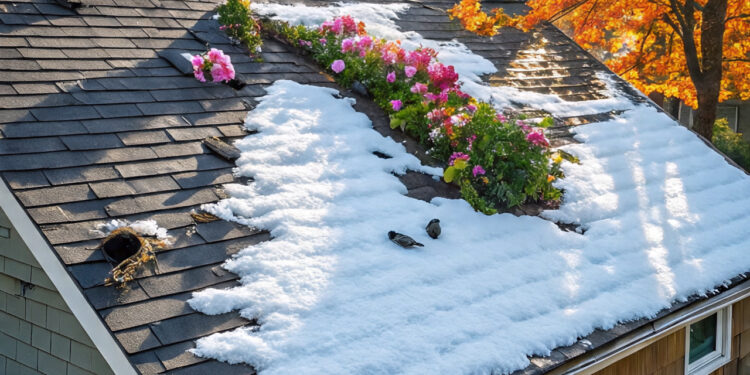Understanding the Relationship Between Weather and Roof Health
Your roof works around the clock to protect your home from the elements. While it may seem strong and stable, it endures constant stress from seasonal weather changes. Temperature shifts, heavy rain, snow, and strong winds all take a toll over time, making regular maintenance and timely roof repair essential for long-term durability.
Each season brings its own set of challenges. From winter’s freezing temperatures to summer’s scorching heat, your roof faces conditions that can cause gradual deterioration if not addressed promptly. Understanding how weather impacts your roof helps you stay proactive and avoid costly problems.
Ridge Runner Roofing specializes in professional roof repair and maintenance, ensuring your roof remains strong and dependable through every season. Their expert team helps homeowners prepare for weather changes with inspections, repairs, and preventive care tailored to local conditions.
Winter: The Strain of Snow and Ice
Cold weather can be particularly harsh on roofing systems. Snow buildup, ice dams, and freezing temperatures create conditions that test your roof’s strength and integrity.
Ice Dams and Leaks
When heat escapes through the attic, it melts the snow on the roof. The melted water refreezes near the eaves, forming ice dams that prevent proper drainage. As water backs up under shingles, leaks and moisture damage occur.
Structural Stress
Heavy snow accumulation adds weight that can strain roof framing and decking, especially on older homes. If not removed, this pressure may cause sagging or even structural damage.
Preventive Tips
- Ensure proper insulation and ventilation in the attic to prevent heat loss.
- Remove excess snow using safe roof rakes or hire professionals.
- Schedule inspections after major snowstorms to detect hidden damage early.
Spring: The Season of Unpredictable Weather
Spring brings fluctuating temperatures, rainfall, and strong winds—conditions that expose any weaknesses in your roof.
Moisture and Mold
Frequent rain can reveal existing leaks or create new ones, especially around flashing, chimneys, and skylights. Moisture that seeps into the attic can lead to mold growth and wood rot.
Wind Damage
Strong spring winds can loosen shingles or lift edges, allowing water to penetrate. Missing shingles should be replaced immediately to prevent leaks.
Preventive Tips
- Inspect your roof for missing or damaged shingles after storms.
- Clean gutters and downspouts to ensure proper water flow.
- Schedule professional roof repair to fix leaks or damaged flashing before the rainy season intensifies.
Summer: Heat and UV Exposure
While summer might seem like the most harmless season, prolonged exposure to high temperatures and UV rays can significantly impact your roof’s lifespan.
Material Breakdown
Intense heat causes roofing materials to expand and contract daily. Over time, this cycle can lead to cracking, warping, or blistering of shingles and other materials.
Energy Efficiency Loss
Dark roofing materials absorb heat, raising indoor temperatures and increasing energy bills. A compromised roof may allow heat to transfer into the home, forcing cooling systems to work harder.
Preventive Tips
- Have your roof inspected for loose shingles, exposed nails, or cracks before peak summer heat.
- Consider reflective roofing materials to reduce heat absorption.
- Schedule mid-summer maintenance to check for early signs of sun damage.
Fall: Preparing for Winter Challenges
Fall is the ideal season for maintenance, as it provides moderate weather for inspections and repairs. However, it also presents its own challenges with falling leaves and debris.
Gutter Clogs
Leaves and twigs often accumulate in gutters, blocking water flow and leading to overflow that can damage your roof, siding, and foundation.
Moisture Traps
Wet leaves on the roof can trap moisture, promoting mold and moss growth that deteriorates shingles.
Preventive Tips
- Clean gutters and downspouts regularly to prevent blockages.
- Remove debris from your roof’s surface before winter.
- Schedule a professional inspection to ensure your roof is ready for cold weather.
Ridge Runner Roofing provides seasonal maintenance programs and expert roof repair services that help homeowners stay prepared, no matter what the forecast brings.
How Seasonal Changes Accelerate Roof Aging
Weather changes cause expansion and contraction cycles that wear down roofing materials over time. These shifts create small cracks and gaps that worsen with each season, eventually leading to leaks and other structural issues.
Roofs exposed to severe weather conditions—such as hailstorms, high humidity, or extreme temperature fluctuations—require more frequent inspections and maintenance. Being proactive helps catch damage before it leads to more serious problems.
The Importance of Regular Inspections
Seasonal inspections are one of the most effective ways to maintain a healthy roof. Expert roofers in Western North Carolina are trained to identify subtle warning signs that homeowners may miss, such as soft spots, worn seals, or compromised flashing.
Benefits of Routine Inspections
- Detect small problems before they become major repairs.
- Prolong the life of your roofing system.
- Maintain energy efficiency and weather resistance.
- Preserve manufacturer warranties through proper maintenance documentation.
Having your roof inspected at least twice a year—typically in spring and fall—ensures it’s prepared to withstand upcoming weather conditions.
Professional Maintenance vs. DIY Efforts
While basic upkeep like cleaning gutters can be done by homeowners, roof inspections and repairs should always be left to professionals. Climbing onto your roof without proper equipment or training can be dangerous and may cause more harm than good.
Professional roofing technicians have the tools and expertise to handle repairs safely and accurately. They also understand how different materials react to seasonal weather, allowing them to recommend preventive measures that keep your roof in peak condition.
Long-Term Benefits of Seasonal Roof Care
Investing in seasonal roof maintenance delivers several long-term advantages that go beyond preventing leaks or damage.
- Extended Roof Lifespan: Regular upkeep prevents premature deterioration.
- Cost Savings: Catching small issues early reduces repair and replacement costs.
- Improved Energy Efficiency: A well-maintained roof helps regulate indoor temperatures.
- Enhanced Property Value: Buyers are more confident purchasing homes with documented maintenance records.
Conclusion: Stay Ahead of the Seasons
Each season brings unique challenges that can affect your roof’s performance and longevity. Understanding how weather impacts your roof allows you to prepare and respond proactively.
Routine maintenance, timely repairs, and professional inspections ensure your roof continues to protect your home year after year.
With expert knowledge and a commitment to quality, Ridge Runner Roofing offers dependable roof repair and seasonal maintenance solutions that keep your home safe, efficient, and ready for any weather Mother Nature brings.







